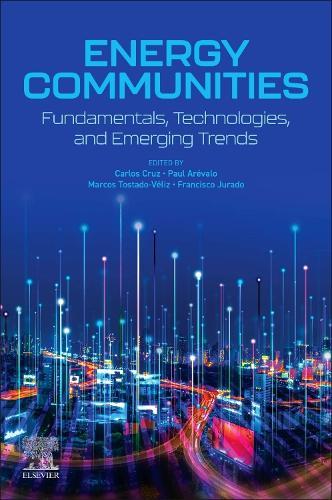Overview
Energy Communities: Fundamentals, Technologies, and Emerging Trends provides a comprehensive guide to understanding, designing, and optimizing energy communities, with step-by-step breakdowns of the technical, economic, and practical principles at play. This book opens by examining the key agents, models, and impacts of energy communities, including infrastructure, generation, and storage technologies. Part II delves into economic considerations, discussing legislative frameworks, barriers, greenwashing risks, and support mechanisms. Part III focuses on complex practical arrangements, providing cutting-edge, detailed case studies examining collective assets and cost-sharing mechanisms. Finally, Part IV addresses energy management and dispatch, highlighting demand and storage technologies utilizing deep learning, big data, and digital twin technology. With its holistic perspective, blending theoretical insights with practical blueprints and real-world case studies, Energy Communities: Fundamentals, Technologies, and Emerging Trends is an essential resource for students, engineers, and academics designing decentralized energy systems to enable renewable energy integration, and future-proof the power infrastructure.
Full Product Details
Author: Carlos Cruz de la Torre (Assistant Professor, Department of Electronics, University of Alcalá, Spain) , Marcos Tostado-Véliz (Assistant Professor, Department of Electrical Engineering, University of Jaén, Spain) , Paul Arévalo (Postdoctoral researcher, University of Jaén, Spain) , Francisco Jurado Melguizo (Professor, Department of Electrical Engineering, University of Jaén, Spain)
Publisher: Elsevier - Health Sciences Division
Imprint: Elsevier - Health Sciences Division
Weight: 0.450kg
ISBN: 9780443364594
ISBN 10: 0443364591
Pages: 250
Publication Date: 21 November 2025
Audience:
Professional and scholarly
,
Professional & Vocational
Format: Paperback
Publisher's Status: Forthcoming
Availability: Not yet available 
This item is yet to be released. You can pre-order this item and we will dispatch it to you upon its release.
Table of Contents
Part I: Energy Communities: Characteristics, Economics and Technology. 1. Energy Communities: agents, models and impact 2. Infrastructures in energy communities: transport, communication and energy 3. Most typical generation and energy storage technologies in energy communities 4. Real Energy Communities worldwide and local electricity markets evolving energy landscape Part II: Economy of Energy Communities 5. Energy communities: legislative, legal and political frameworks 6. Social, technological, economic, legislative barriers, and property rights for implantation and development of energy communities 7. From greenwashing risks to misleading environmental claims 8. Economic support for the development of energy communities and commons-based governance models 9. Social role of energy communities Part III: Arrangement of Energy Communities 10. Access to collective assets in energy communities 11. Cost-sharing mechanisms in energy communities 12. Case study 13. Case study Part IV: Energy management and dispatch in energy communities 14. Demand and storage optimization in energy communities 15. Emerging trends: artificial intelligence, deep learning, big data, and the role of digital twins applied to energy communities 16. Case study 17. Case study
Reviews
Author Information
Carlos Cruz de la Torre is currently an Assistant Professor of the Department of Electronics at the University of Alcalá, Spain. Dr Cruz holds an M.Sc. in Electronics Engineering from the University of Granada, Spain, and a PhD in Electronics from the University of Alcalá, Spain. He is an experienced engineer (ESRF and ALBA Synchrotrons, ESSBilbao, CSIC and CIEMAT centers) with a wide-ranging background in detector evaluation, software simulation and hardware design. His areas of research are optimization of energy communities, energy data analysis, electronic design, and reconfigurable hardware. Marco Tostado-Véliz is an Assistant Professor in the Department of Electrical Engineering at the University of Jaén, Spain. He received a Bachelors degree in Electrical Engineering (with Hons.) in 2016 and Masters degree in 2017, both from the University of Seville, Spain, and obtained his PhD degree in 2020 from the University of Jaén, Spain. His primary research interests include smart grids, numerical methods for power system analysis, optimization of energy communities, multi-energy systems modelling, and computing tools for home energy management systems. Paul Arévalo is a postdoctoral researcher at the University of Jaén and the University of Cuenca, Spain. His current research includes the planning and optimization of renewable energy systems, power systems, energy control, and demand forecasting. Dr Arévalo received a degree in electrical engineering from the University of Cuenca, Ecuador, in 2015. He received an M.Sc. in renewable energy management and an M.Sc. in renewable energies from the Rey Juan Carlos University in Madrid and the University of Jaén, Spain, respectively. In 2021, he received a Ph.D. in advances in materials engineering and sustainable energies. Francisco Jurado has been a Professor with the Department of Electrical Engineering, University of Jaén, Spain, since 1985. His current research interests include power systems, modeling, and renewable energy. He is a Senior Member of the IEEE.
Tab Content 6
Author Website:
Countries Available
All regions
|



